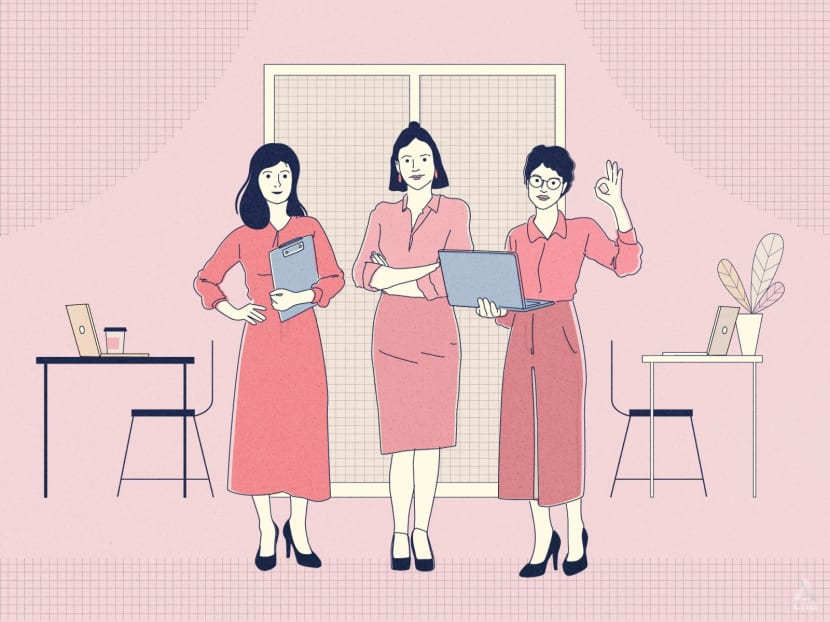At the workplace, women who adjust their persona to be more ‘masculine’ do so at their own risk
In dealing with gender bias, women will be better off being true to their authentic selves than adjusting their personalities to fit workplace norms.

Gender stereotypes and subconscious biases are often amplified in the workplace, which prioritises competitiveness. (Illustration: CNA/Samuel Woo)

This audio is generated by an AI tool.
Adulthood is not just one phase of life but comes in stages. Its many facets can be overwhelming, from managing finances and buying a home to achieving work-life balance and maintaining healthy relationships. In this series, CNA TODAY's journalists help readers deal with the many challenges of being an adult and learn something themselves in the process.
With more than 20 years of experience in male-dominated industries including the technology field, Ms Andrea Tan has had her share of sexist encounters at the workplace.
Despite having more than a decade of experience in the financial sector, she was once told that she was not needed to join a discussion about infrastructure because it was deemed “too technical” for her.
Now in her 40s and leading the financial technology marketing and communications unit of a company, she said that it was only later in her career that she recognised subtler workplace dynamics, those that point to a gender bias and are more covert than the obvious inappropriate jokes brushed off as "locker-room talk" and dismissive remarks about working mothers' inability to balance work and family commitments.
For instance, when a woman is assertive, expresses her opinions or asks for things to be done, it may be labelled as “too much”, Ms Tan added. The woman would be seen as being too pushy or be characterised as being aggressive or emotional.
“I’ve seen other male ex-colleagues ask for what they want directly and sometimes push particularly hard in some negotiations – it was never about being emotional, they were seen as ‘knowing their stuff’.”
She recalled that she once had a lively debate with a female colleague about system requirements and after that, some teammates branded them as “fierce women” to avoid.
Ms Tan is not alone in noticing such perceptions in the workplace. In conversations with CNA TODAY, women from various industries and human resource experts agreed that the very traits that make men seem like confident leaders often lead to women being labelled as abrasive.
Conversely, women who are soft-spoken or perceived as “too nice” are criticised for lacking in confidence and drive.
If advancing in your career depends on being heard, how can women strike the right balance without the risk of being labelled as “difficult”?
Why do such biases still persist in the 21st century and what can women do to navigate them effectively?
DOUBLE STANDARDS, "DOUBLE BIND" FOR WOMEN AT WORKPLACE
Experts in human resources and gender studies said that gender stereotypes and subconscious biases are often amplified in the workplace, which prioritises competitiveness while casting ideal leaders as dominant and tough, which are traits typically associated with masculinity.
Associate Professor Kenneth Tai from the Singapore Management University (SMU) said that gender norms expect men to be assertive, controlling and confident.
By contrast, women are often expected to be gentle and sympathetic to others’ needs.
“Research has shown that women who behave more (rather than less) assertively are likely to be penalised, such as being perceived as more demanding, less likeable and less likely to be hired,” Assoc Prof Tai said. His research in organisational behaviour and human resources includes understanding how people cope with negative interpersonal events at the workplace.
Separately, the 2022 White Paper on Singapore Women's Development conducted by the Ministry for Social and Family Development had found that some women continue to face glass ceilings and obstacles due to stereotypes at work.
Although data from the White Paper showed that more women are taking on leadership roles, Assoc Prof Tai noted that female leaders are often caught in a “double bind”.
They are penalised both for displaying masculine traits such as assertiveness and for displaying “feminine traits” such as warmth, which are inconsistent with stereotypes of how leaders should behave.
Ms Sugidha Nithiananthan from the Association of Women for Action and Research (AWARE) said that this is rooted in “deep-seated gender biases” and expectations within society that associate women with taking on nurturing and agreeable roles.
The director of advocacy and research added: “Behaviours such as confidence and decisiveness, typically viewed positively in men, are frequently misinterpreted as ‘aggressive’ or ‘unfeminine’ when displayed by women.”
Women thus face “disproportionate pushback” at work when negotiating, providing direct feedback or advocating for themselves.
Ms Lim Chai Leng from human resources firm Randstad Singapore said that gender-based biases in communication styles are rarely acknowledged in workplace policies. She is general manager of banking, life sciences, construction and property at her firm.
“Gender discrimination related to communication styles often goes unnoticed within anti-discrimination policies, because these issues are frequently categorised as personality or leadership traits that require further development,” Ms Lim added.
This oversight perpetuates unhelpful stereotypes and hinders the professional growth of individuals whose communication styles do not align with traditional expectations.
SHOULD WOMEN ACT LIKE MEN AT WORK?
On the point that women are expected to be being warmer and non-confrontational, many of my female friends have said that even sending an email can become a tricky balancing act.
Writing an email should be straightforward and efficient: Fill in the recipient's email address, indicate the subject, put in your text and send.
In an effort to sound polite and avoid coming across as pushy, my friends have said that what they write are often softened with qualifiers such as “I was just wondering if ...” or “Would it be possible to ...”.
Straightforward requests may then end up sounding like pleas, diluted further with exclamation marks and other remarks to help the recipient not feel too agitated or stressed.
“Just write like a man,” one friend quipped. “Drop the exclamation marks and cut the pleasantries.”
Is the answer then to suppress certain instincts or traits, or take on a specific persona, to communicate more efficiently at work?
Ms Lim from Randstad Singapore cautioned that such an approach can lead to feelings of disconnection and poorer job satisfaction, or it might even backfire in the long run.
“When women adjust their personality to fit workplace norms, they will experience an internal conflict between being their authentic selves and expectations imposed by gender biases.”
True, it is common for everyone regardless of gender to adopt a “work persona”, but this should be aligned with one’s true self and individual career goals, rather than conforming to workplace expectations, Ms Lim added.
Reflecting on her own career, Ms Tan said that she initially modelled “masculine traits” thinking they are indicators of leadership, but found greater fulfilment when she embraced her authentic self.
“I only realised later on that women leaders are not female versions of male leaders.
"Being comfortable in my own skin and gender, to navigate the meeting room the way I know how gave me so much more energy when I was not pretending to be something else,” she added.
When in doubt of your approach and how you are being perceived, experts advised workers to ask for constructive feedback on your communication style. They may also want to find some group support to navigate the social minefield of the workplace.
Some suggestions include seeking validation from external parties who may be a friend, a professional women’s network or industry peers and mentors. These may help one to build confidence and gather tips on handling tough situations.
Mr Kenji Naito, group chief executive officer of recruitment agency Reeracoen Singapore said that open conversations with managers can help clarify any misunderstandings and may allow the person to understand how their assertiveness is being perceived.
“For women in junior roles, asking insightful questions and giving suggestions that align with team goals demonstrates initiative while respecting boundaries,” Mr Naito added.
Agreeing, Ms Lim from Randstad Singapore said that to fine-tune one's approach, it may help to observe colleagues’ communication preferences, whether they prefer concise discussions or detailed context, as well as how peers interact with them.
DO YOUR BEST BUT KNOW THERE ARE LIMITS
Ultimately, the experts stressed that addressing gender biases in the workplace takes more than individual effort. It requires change at an organisational level.
“Women can adopt strategies to navigate and challenge biases, but it’s crucial to recognise that the onus should not rest solely on them to fix systemic issues,” Ms Nithiananthan from AWARE said.
Biases in perceptions of assertiveness are “symptoms of larger systemic issues”, she added.
“Gender discrimination is deeply embedded in workplace cultures and structures, and creating equitable environments requires collective action.”
Assoc Prof Tai from SMU said that managers may cultivate a "culture of assertiveness" by encouraging and rewarding behaviours such as engaging in constructive dissents.
Increasing female representation in work teams and leadership roles could go some way in reducing the likelihood that assertive women are penalised for being perceived as violating norms, he added.
Should patterns of discrimination emerge, keeping records of incidents where your assertiveness was misinterpreted or penalised can be helpful for discussions with human resources personnel or your manager, the experts said.
Ms Lim from Randstad Singapore said that keeping a record of past achievements and positive impact at the workplace can help serve as a reminder of one’s capabilities.
Still, if entrenched biases continue to block your growth within an organisation despite your efforts, it may be time to reassess your environment and seek out an employer who values diversity and inclusion.
“Working in a company that recognises the benefits of diverse perspectives creates a more supportive workplace for your professional development,” Ms Lim said.












